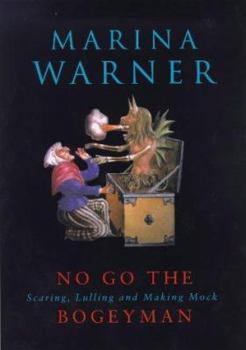No Go The Bogeyman
Select Format
Select Condition 
Book Overview
The author of From the Beast to the Blond considers the enduring presence and popularity of figures of male terror, establishing their origins in mythology and their current relation to ideas about... This description may be from another edition of this product.
Format:Hardcover
Language:English
ISBN:0701165936
ISBN13:9780701165932
Release Date:January 1999
Publisher:Chatto & Windus
Length:446 Pages
Weight:2.60 lbs.
Dimensions:9.5" x 1.5" x 6.5"
Related Subjects
Art Arts, Music & Photography Emotions Folklore & Mythology Health, Fitness & Dieting Health, Fitness & Dieting History & Criticism Humanities Literary Criticism Literary Criticism & Collections Literature Mental Health Movements & Periods Physiological Aspects Politics & Social Sciences Psychology Psychology & Counseling Self Help Self-Help Self-Help & Psychology Social Science Social SciencesCustomer Reviews
3 ratings
Terrific treatment of the terrors that go bump in the night
Published by Thriftbooks.com User , 19 years ago
I happened to be researching a paper for my graduate studies and came across a mention of this book. I was fortunate to find an inexpensive copy of the hardcover edition (though, in retrospect, the book is worth its original retail price). Warner does an excellent job presenting not only a historical perspective on the bogeyman figure (from ogre to nursery cautionary figure to cannibal) but also a literary foundation for such a beastie. Whether you are interested in horror tales or folklore, this book will be a worthwhile primer in the topic of fear.
"The Children Were Snugly Put To Bed In A Comfortable Crust"
Published by Thriftbooks.com User , 20 years ago
Marina Warner's No Go the Bogeyman (1998) is a mesmerizing, rollicking, and joyously politically incorrect examination of the sociological origins of the nighttime bedroom phantasm known throughout the West as 'the bogeyman,' a being that the author links directly to the cannibalistic ogre figure so prevalent in classic fairytale lore. The bogeyman, Warner theorizes, is a psychological and metaphorical shadow manifestation of the 'bad father,' who corresponds almost exactly to the 'wicked stepmother' of fairytale tradition. Warner believes that these negative parental images are obscure, metaphorical, and atavistic visages from an early time, when overt and covert competition for immediate survival amongst family members was a terrifying fact of daily life. Warner suggests that while most parents may today fulfill the required roles of guardian, nurturer, and provider in most cases most of the time, every adult has the inherent potential to relinquish one or all of them, and become an abandoner at best, and a predator, child killer, or cannibal at worst. Not that Warner lets children off easily: like Camille Paglia, Warner refuses to see children as essentially benign, innocent, and tender-hearted. Warner sees infancy in particular as a time of "unappeasable demands and violent greed," behavior which, by a strange but spontaneous circularity, is often the very behavior by which "ogres and giants--and cannibal witches" are defined. Thus, part of the reason such tales exist and are read to impressionable children is because the stories teach their young audiences to recognize and reject their own worst personal and social inclinations. Does the human need to eat, and thus destroy other life at some level, result in a continuous but little realized psychic cycle of guilt, self-loathing, anxiety, and horror for mankind, especially when commingled with incestuous familial entanglements? Are we all 'monsters' of some kind at some level? In a hilarious but acute look at the present-day "American identity," the author perceives many Americans as "pillowy and flaccid and fluffy and fat, like babies," members of a "generalized cult of childishness, a widespread, let's pretend infantilism" which "then fosters the image of the monster babies: they have something which we lack, which we desire. Baby envy has eclipsed [...]envy." Warner also deftly illustrates how Freud's Oedipal theory, in which the young male child secretly desires to destroy the father with whom he feels competitive, is the direct inverse of the ogre's desire to devour his children and thus, Kronos-like, eliminate any competition his offspring may represent in the years to follow. Thus while the son, partially projecting a sense of his own unacceptable instincts, sees the father as the "child-guzzler," the father may perceive his child as a life-sucking parasite that may rob him of his future, drain away his vitality, and one day assume his place and position if something isn't
5 stars - excellent
Published by Thriftbooks.com User , 25 years ago
A fabulous and profoundly insightful book that answers some very significant (and perhaps unconscious) questions: Why are we compelled to scare our children? And why do children delight in being terrified? An absolute must for both parents and students of folklore.





